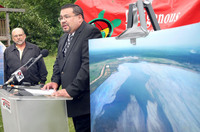

Opponents try late rally against Enbridge pipeline
John Myers
Duluth News Tribune
June 30, 2009
 Marty Cobenais, with the Indigenous Environmental Network out of Bemidji, describes the pollution and environmental destruction caused by mining tar sands in Alberta at a press conference today in Duluth. The photo at right is of a tailings pond in Alberta. (Bob King / king@duluthnews.com) |
Opponents of the Enbridge Alberta Clipper pipeline rallied today in Duluth to announce they are trying legal and political efforts to stop the oil pipeline.
A rural Superior landowner says the Enbridge Energy pipeline slated to cross his land will damage wetlands. A Thief River Falls farmer says the pipeline will cause flooding of his crops. And a Leech Lake tribal member says she’s on a spiritual mission to stop the pipeline and the flow of Canadian tar sands oil into the U.S.
Opponents of the Enbridge Alberta Clipper pipeline rallied today in Duluth to announce they are trying legal and political efforts to stop the oil pipeline.
“We are a vote of unity for our brothers and sisters’’ in Canada, said Marty Cobenais of the Bemidji-based Indigenous Environmental Network.
But it’s not clear if opponents can succeed before construction begins in coming weeks. The company already is stockpiling pipe along the route and the U.S. State Department is expected to issue a permit allowing the pipeline to advance.
Enbridge already has approval from the Minnesota Public Utilities Commission to cross the state. The company also has signed agreements with the Fond du Lac and Leech Lake band governments to cross those reservations.
And a federal environmental impact statement concluded the pipeline, which will parallel an existing oil pipeline, will not create serious environmental harm.
Tony Podgorak, who owns Douglas County land that the pipeline will cross on the way into Superior, said the route includes several water and wetland crossings that will be irrevocably harmed. And he said there’s a human health risk if the chemicals proposed to be pumped north into Canada along the line ever spill.
“What they want to push back to Canada along the line is very toxic,’’ he said.
Elizabeth Sherman, Leech Lake band member, criticized Fond du Lac and Leech Lake governments for approving the pipeline while Cree people in Alberta are affected. Sherman and Cobenais said opponents will file a request for an injunction against the pipeline next week in Leech Lake tribal court.
“I’m on a spiritual mission,’’ Sherman said. “We are rising up and saying no.”
But Karen Diver, chairwoman of the Fond du Lac band, said she has not heard any opposition of her band’s agreement to allow Enbridge to cross the reservation. The amount the company paid the Fond du Lac Band for the right-of-way has not been disclosed. Leech Lake received $10 million from Enbridge.
“We’ve heard absolutely no opposition. No one has come forward,’’ Diver said. “The reason we struck an agreement with (Enbridge) is that the least environmentally damaging route was along the existing pipelines. Going around the reservation would have been worse. … As for the tar sands oil, it’s up to Canada to permit that.’’
Opponents are encouraging others to write Secretary of State Hillary Clinton to oppose the pipeline. Clinton is expected to make a decision as early as next week.
The Minnesota Center for Environmental Advocacy has filed several lawsuits against the pipeline. But, pending any court injunction, Denise Hamsher, Enbridge spokeswoman, said Friday that the company is ready to begin work when the State Department permit is issued. The project is expected to create some 3,000 construction jobs in the region.
Opponents of the pipeline say the oil is among the dirtiest in the world and that mining it from tar sands is damaging the environment for native tribes in Canada. It’s blamed for leaving scarred landscapes and polluted waters in northern Alberta. Tar sand oil also is high in carbon dioxide, a greenhouse gas, and requires more energy to process, opponents say.
The pipeline would carry about 450,000 barrels of oil, or 19 million gallons, per day. That would be in addition to the 1.6 million barrels per day the company already moves through an existing pipeline along the same route.
The $1.2 billion U.S. segment of the pipeline is part of an $8 billion system expansion that will bring oil from Alberta into the U.S., 285 miles across Minnesota and into Wisconsin. From Superior, the oil could either be refined at the Murphy Oil facility or piped another 450 miles to Illinois.
Posted by Arthur Caldicott on 02 Jul 2009